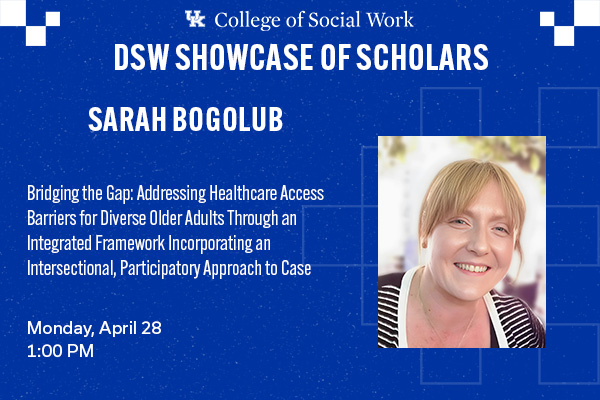DSW Candidate – Sarah Bogolub, 1:00 PM – 2:15 PM
$0.00
Virtual Showcase of DSW Scholars 2025 Event!
Bridging the Gap: Addressing Healthcare Access Barriers for Diverse Older Adults Through an Integrated Framework Incorporating an Intersectional, Participatory Approach to Case Management in Healthcare
DSW Candidate – Sarah Bogolub, MSW, LCSW
Monday, April 28, 2025
1:00 PM- 2:15 PM Eastern Time Zone
Credit Hours: 1.0
Description
Bridging the Gap: Addressing Healthcare Access Barriers for Diverse Older Adults Through an Integrated Framework Incorporating an Intersectional, Participatory Approach to Case Management in Healthcare
Intersecting barriers affecting healthcare access disproportionately impact older adults in the United States, leading to inequities such as cultural and language differences, health literacy issues, lack of social support, isolation, economic disparities, relationships with healthcare providers, and the necessity for community-based solutions. This capstone presentation emphasizes how these barriers are exacerbated for individuals in marginalized groups and those with multiple intersecting identities. Case management social work is critical in addressing healthcare equity for older adults by ensuring access to services. However, established healthcare frameworks have not successfully addressed the barriers older adults face, the impact of intersectionality, and the importance of including older adults in the process.
This capstone project explores the intersection of healthcare access barriers and systemic inequities faced by diverse older adult populations through integrating feminist, critical disability, and intersectionality theories. The integrated theoretical framework was used to create a resource guide for social worker case managers, facilitating a collaborative approach to identifying barriers and developing interventions for older adults through participatory action research (PAR). The guide includes a stratified risk assessment that enables case managers to address the barriers that older adults face through self-assessment, individual characteristics, health severity needs, cultural considerations, and lived experiences. This research aims to empower older adults and provide actionable solutions for social work professionals to bridge healthcare gaps and enhance their overall quality of life.
Upon completion of this conference, participants will be able to:
- Identify the barriers to healthcare access in older adult populations and the impact of intersectionality.
- Learn the role of Participatory Action Research (PAR) in case management practice and will be given examples of how it can be applied.
- Recognize current policy gaps that contribute to healthcare disparities and how an intersectional stratified risk model can improve interventions and outcomes.
Delivery Method: Live Interactive Training via Zoom Video Conferencing
Credit Hours: 1.0 (ACE)
Target Audience: This conference is intended for social workers and students.
Accreditation: University of Kentucky College of Social Work, Provider # 1377, is approved as an ACE provider to offer social work continuing education by the Association of Social Work Boards (ASWB) Approved Continuing Education (ACE) program. Regulatory boards are the final authority on courses accepted for continuing education credit. ACE provider approval period: 9/29/22-9/29/25. Social workers participating in this conference will receive up to 15 general continuing education credits.
Claiming CE Credit: Instructions for claiming CE credit will be disseminated at the beginning of each session.
Questions: If you have any questions regarding CE credit or to report a grievance, please contact Christina Krantz at Christina.Krantz@uky.edu. For technical assistance, please contact lmshelp@uky.edu.
Disclaimer: The views and opinions expressed in these presentations are those of the individual presenters and do not necessarily reflect the official policies or positions of the University of Kentucky or the College of Social Work. The inclusion of any topics, perspectives, or discussions is intended for academic engagement and does not constitute endorsement by the institution.
